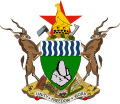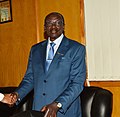| Vice-Presidents of the Republic of Zimbabwe | |
|---|---|
 | |
since 28 December 2017 (First) since 8 September 2023 (Second) | |
| Executive branch of the Zimbabwean Government | |
| Style | His Excellency Mr Vice President |
| Appointer | President of Zimbabwe |
| Term length | 5 years, renewable once [1] |
| Inaugural holder | Simon Muzenda (First) Joshua Nkomo (Second) |
| Formation | 31 December 1987 |
| Website | zimbabwe |
The vice-president of Zimbabwe is the second highest political position obtainable in Zimbabwe. Between 1987 and 1990, there was a provision for only one vice-president; since 1990 there is a provision for two. The vice-presidents are appointed by the president of Zimbabwe, and are designated as "First" and "Second" in the Constitution of Zimbabwe; the designation reflects their position in the presidential order of succession.
Contents
- List of officeholders
- First vice-presidents
- Second vice-presidents
- Rank by time in office
- First vice-presidents 2
- Second vice-presidents 2
- See also
- Notes
- References
Under the ruling ZANU–PF party, the vice-presidential post ranked first in the order of succession has traditionally been reserved for a representative of the party's historical ZANU wing (mainly ethnic Shona), while the other vice-presidential post has gone to a representative of the party's historical ZAPU wing (mainly ethnic Northern Ndebele).
 |
|---|











